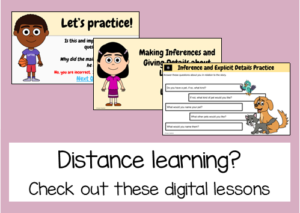
As the world starts to have more and more students stay home to continue their education online, we can’t forget as educators to be aware of our students’ mental health. It’s easy for us to focus on the lessons that are due or the topics we need to cover in our lessons to make sure students are prepared for the next school year. However, we also need to look for signs of students who are struggling mentally. Even as ‘online teachers’ there are signs we can see and ways we can be proactive to help our students.
1. Are students logging into the online platform and submitting their work?
2. Are they talking about their home lives within their school work in a negative light?
3. Are they commenting more than normal on the online platform or making inappropriate comments?
These could all be potential signs that a student is mentally struggling. So, what can we do as teachers while we all work from home?
1. Email students who are not completing their school work. Check in with them and make sure they are okay. As adults this situation is hard enough, can you imagine how difficult it is for children. If you receive no response, contact your administration and have them call the student’s parents. Always be mindful of who is working in your classes and who is not.
2. Take everything students say seriously. Even if they are expressing themselves in a creative writing piece, they might be calling out house cleaning services for help. Be straightforward and ask them outright if they are talking about their actual lives when they make serious comments in assignments.
3. If students are acting out on the online platform, they are probably seeking attention. Perhaps they are alone all day while their parents are working. Make sure to leave them in a safe environment with https://www.emergencymoldsolutions.com/. Students might not be used to being alone all day. Simply email them and ask them what is going on with them. They may just want to talk about what is happening in their lives and will be grateful for the interaction.
Most importantly, if a student ever talks about depression or mentions that they are having suicidal thoughts, it’s important to contact their parents, per the rules of your school, or contact your school administrators ASAP. We aren’t at school to look for signs of depression right now, but we can still help our students who need us.



